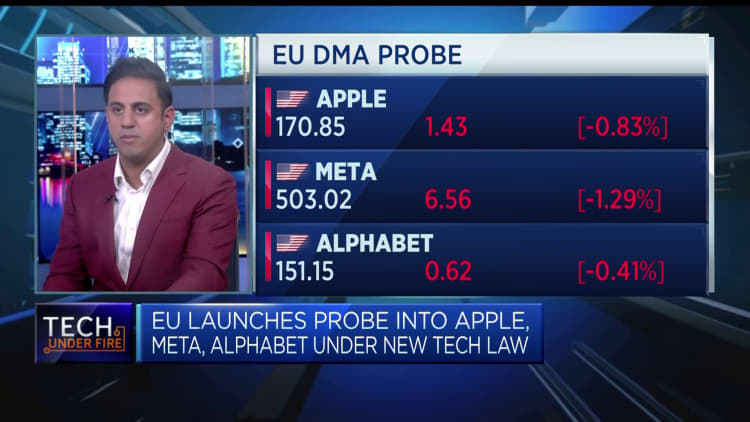
The European Union on Monday began an investigation into Apple, Alphabet and Meta, in its first probe under the sweeping new Digital Markets Act tech legislation.
“Today, the Commission has opened non-compliance investigations under the Digital Markets Act (DMA) into Alphabet’s rules on steering in Google Play and self-preferencing on Google Search, Apple’s rules on steering in the App Store and the choice screen for Safari and Meta’s ‘pay or consent model,'” the European Commission said in a statement.
The first two probes focus on Alphabet and Apple and relate to so-called anti-steering rules. Under the DMA, tech firms are not allowed to block businesses from telling their users about cheaper options for their products or about subscriptions outside of an app store.
“The way that Apple and Alphabet’s implemented the DMA rules on anti-steering seems to be at odds with the letter of the law. Apple and Alphabet will still charge various recurring fees, and still limit steering,” the EU’s competition chief, Margrethe Vestager, said during a news conference Monday.
Apple has already fallen foul of the EU’s rules. This month, the company was fined 1.8 billion euros ($1.95 billion) after the European Commission said it found that Apple had applied restrictions on app developers that prevented them from informing iOS users about alternative and cheaper music subscription services available outside of the app.
In a third inquiry, the commission said it is investigating whether Apple has complied with its DMA obligations to ensure that users can easily uninstall apps on iOS and change default settings. The probe also focuses on whether Apple is actively prompting users with choices to allow them to change default services on iOS, such as for the web browser or search engine.
The commission said that it is “concerned that Apple’s measures, including the design of the web browser choice screen, may be preventing users from truly exercising their choice of services within the Apple ecosystem.”
Apple said it believes it is in compliance with the DMA.
“We’re confident our plan complies with the DMA, and we’ll continue to constructively engage with the European Commission as they conduct their investigations. Teams across Apple have created a wide range of new developer capabilities, features, and tools to comply with the regulation,” an Apple spokesperson told CNBC on Monday.
The fourth probe targets Alphabet, as the European Commission looks into whether the firm’s display of Google search results “may lead to self-preferencing in relation to Google’s,” other services such as Google Shopping, over similar rival offerings.
“To comply with the Digital Markets Act, we have made significant changes to the way our services operate in Europe,” Oliver Bethell, director of competition at Alphabet, said in a statement.
“We have engaged with the European Commission, stakeholders and third parties in dozens of events over the past year to receive and respond to feedback, and to balance conflicting needs within the ecosystem. We will continue to defend our approach in the coming months.”
Alphabet pointed to a blog post from earlier this month, wherein the company outlined some of those changes — including giving Android phone users the option to easily change their default search engine and browser, as well as making it easier for people to see comparison sites in areas like shopping or flights in Google searches.
Meta investigation
The fifth and final investigation focuses on Meta and its so-called pay and consent model. Last year, Meta introduced an ad-free subscription model for Facebook and Instagram in Europe. The commission is looking into whether offering the subscription model without ads or making users consent to terms and conditions for the free service is in violation of the DMA.
“The Commission is concerned that the binary choice imposed by Meta’s ‘pay or consent’ model may not provide a real alternative in case users do not consent, thereby not achieving the objective of preventing the accumulation of personal data by gatekeepers.”
Thierry Breton, the EU’s internal market commissioner, said during the news conference that there should be “free alternative options” offered by Meta for its services that are “less personalized.”
“Gatekeepers” is a label for large tech firms that are required to comply with the DMA in the EU.
“We will continue to use all available tools, should any gatekeeper try to circumvent or undermine the obligations of the DMA,” Vestager said.
Meta said subscriptions are a common business model across various industries.
“Subscriptions as an alternative to advertising are a well-established business model across many industries, and we designed Subscription for No Ads to address several overlapping regulatory obligations, including the DMA. We will continue to engage constructively with the Commission,” a Meta spokesperson told CNBC on Monday.
Tech giants at risk of fines
The commission said it intends to conclude its probes within 12 months, but Vestager and Breton during the Monday briefing stressed that the DMA does not dictate a hard deadline for the timeline of the inquiry. The regulators will inform the companies of their preliminary findings and explain measures they are taking or the gatekeepers should take in order to address the commission’s concerns.
If any company is found to have infringed the DMA, the commission can impose fines of up to 10% of the tech firms’ total worldwide turnover. These penalties can increase to 20% in case of repeated infringement.
The commission said it is also looking for facts and information to clarify whether Amazon may be preferencing its own brand products on its e-commerce platform over rivals. The commission is further studying Apple’s new fee structure and other terms and conditions for alternative app stores.
This month, the tech giant announced that users in the EU would be able to download apps from websites rather than through its proprietary App Store — a change that Apple has resisted for years.
The EU’s research into Apple and Amazon does not comprise official investigations.